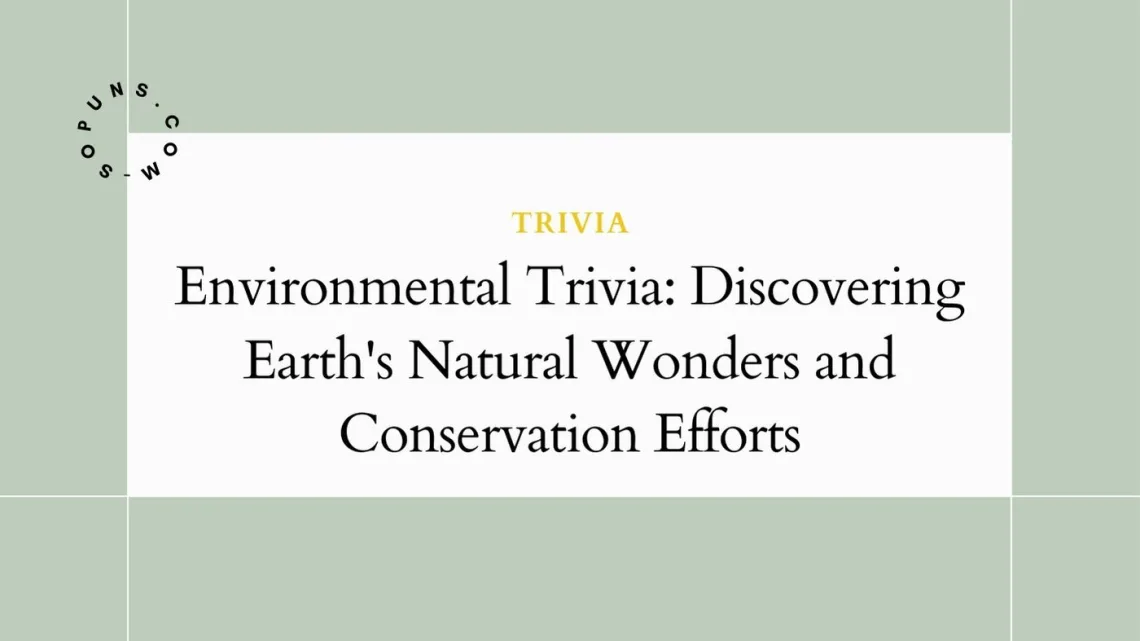Our planet Earth is truly a marvel, home to incredible diversity across landscapes and ecosystems. From lush rainforests to barren deserts, from deep valleys to towering mountains, there is so much natural beauty to appreciate. But Earth’s wonders are more than just visual spectacles – they also harbor fascinating stories about the interconnectedness of ecology and the importance of conservation. Read on for remarkable environmental trivia that will deepen your appreciation for our planet’s precious ecosystems.
Diverse Ecosystems and Biomes Hold Hidden Gems of Trivia
Earth’s major biomes each have their own ecological characteristics that make them unique. The tundra, for example, is known for its harsh, frozen climes, but did you know that the word “tundra” comes from the Finnish word “tunturia” meaning “treeless plain”? Meanwhile, the largest biome on Earth is actually our oceans, which cover over 70% of the planet’s surface and remain 95% unexplored by humans.
Rainforests only cover 6% of Earth’s surface but are home to over half of the world’s plant and animal species. One amazing rainforest fact: a single rainforest tree can host over 750 types of insects, and there may be millions of insect species not yet discovered. Deserts are the driest biomes, yet certain desert plants like cacti have adapted to thrive in these harsh conditions. The iconic saguaro cactus can grow over 40 feet tall and survive for up to 200 years. One saguaro can hold up to 4 tons of water after a rainstorm!
Meet the Environmental Activists Who Made History

Many environmental activists have devoted their lives to protecting our planet. Rachel Carson’s book Silent Spring revealed the detrimental impacts of pesticides on ecosystems, helping spur the modern environmental movement. Wangari Maathai founded the Green Belt Movement that planted over 51 million trees in Africa and was the first African woman awarded the Nobel Peace Prize. Greta Thunberg has inspired youth climate activism through her viral school strike for climate.
Some trailblazing conservationists you may not know about include Marjory Stoneman Douglas, who saved the Florida Everglades from being drained and destroyed. She lived to be 108 years old! Dame Jane Goodall revolutionized how we study chimpanzees and advocated for forest conservation. Royal engineer George Perkins Marsh wrote the pioneering book Man and Nature in 1864, which warned of humanity’s ability to cause environmental damage.
Natural Wonders Hold Ecological Significance
Earth’s natural wonders not only look breathtaking but also carry ecological importance. The Great Barrier Reef is the largest living structure on Earth – its corals provide marine habitat and prevent coastline erosion. The Amazon Rainforest produces 20% of the world’s oxygen through photosynthesis. Half of the world’s oxygen is produced by marine plants called phytoplankton.
The intricate cave systems of Mammoth Cave National Park filter and purify tremendous amounts of water. The towering redwood forests of California can reach over 300 feet tall and capture significant amounts of carbon dioxide. Even the stark beauty of the Sahara Desert helps regulate Earth’s climate through solar radiation reflection. Appreciating these natural wonders for both their beauty and ecology fosters environmental awareness.
Environmental Trivia Inspires an Eco-Conscious Mindset
Learning fun facts about the natural world provides memorable trivia while also nurturing an eco-conscious mindset. Discovering how shorebirds migrate incredible distances or how Antarctic icefish evolved “antifreeze” proteins to survive subzero temperatures sparks an appreciation for wildlife resilience. Understanding how coral polyps create enormous reef structures or how floating mangrove roots enable them to thrive in saltwater reveals nature’s innovative adaptations.
Even learning the science behind bioluminescent fungi or carnivorous plants satiates our curiosity while underscoring the interconnectedness of habitats. Sharing these environmental trivia tidbits inspires stewardship, whether it’s in our backyards, neighborhoods, cities, or the planet at large. A little knowledge goes a long way when it comes to environmental responsibility.
Eco-Trivia Questions Test Your Knowledge

Here are some trivia questions to test your newfound environmental knowledge:
- Which extremely endangered big cat species can’t roar but instead purrs like a housecat? (Answer: The snow leopard)
- What is the term for animal species like pandas and koalas that rely heavily on one food source? (Answer: Obligate herbivore)
- What seed dispersal method do burr-covered seeds like stick tights use to hitch rides on animal fur? (Answer: Epizoochory)
- What type of wetland acts as a natural water filter by removing pollutants from rainwater runoff? (Answer: A riparian wetland)
- Which phenomenon naturally cleans the air by removing pollutants like smog and dust? (Answer: Rain)
Testing your knowledge keeps the environment top-of-mind while reinforcing key concepts. Casual eco-trivia is an interactive, memorable way to boost environmental literacy.
The Role of Trivia in Promoting Eco-Consciousness
Environmental trivia is not just fun facts – it serves the important purpose of fostering ecological consciousness. Learning how shorebirds navigate via magnetic fields or how mycelium fungi networks transport nutrients promotes a mindset of respect and appreciation for the natural world. Discovering how climate change threatens habitats like melting Arctic sea ice motivates us to live more sustainably.
Trivia reveals interconnections in the web of life that emphasize how human actions impact the environment. Knowing that mature trees mitigate over 100 pounds of air pollution annually or that coral polyps alter their biology when oceans warm just 1 degree Celsius highlights the ripple effects of our choices. Simple trivia makes these ecological relationships more tangible. Whether shared in classrooms, social media, or casual conversation, environmental trivia creates “aha” moments that stick with us and shape our worldview.
Spread Trivia to Inspire Environmental Stewardship
Now that you know some fascinating ecological trivia, it’s your turn to share these captivating facts and inspire environmental stewardship in others. Test out trivia tidbits at the dinner table, around the campfire, or during classroom icebreakers.
Post an intriguing eco-fact on social media like how gray whales migrate over 10,000 miles roundtrip yearly. Slip trivia into lulls in conversations, like how one tree can filter up to 60 pounds of pollutants annually. Email notable trivia to friends and family, like how the peregrine falcon dives at speeds over 200 mph, making it the fastest bird in the world.
You have the power to foster environmental awareness through fun trivia. See someone litter? Casually mention how long plastic bags take to decompose. Know someone who idles their car? Share how idling for just 10 seconds uses more gas than restarting the engine. You can ignite ecological connections through everyday trivia. Our planet is too awe-inspiring not to share its wonders.
Frequently Asked Questions
Where can I find more environmental trivia to learn and share?
There are many online resources, books, nature organizations, and documentaries to discover more ecological trivia. Reputable environmental groups like the Nature Conservancy, Sierra Club, and National Wildlife Federation offer interesting blogs and nature newsletters. Also try eco trivia books, nature podcasts, science TV shows, zoos, aquariums, and natural history museums.
Is all environmental trivia trustworthy or accurate?
It’s wise to verify facts from reputable sources. When in doubt, look for peer-reviewed research, facts from science journals like National Geographic and Scientific American, and information from respected environmental organizations. Be wary of unverified online trivia and assumptions stated as facts.
How can I share environmental trivia with kids?
Make learning fun by sharing trivia during nature walks, while gardening, or during hands-on science activities. Have kids create their own trivia cards. Incorporate trivia into Earth Day school events. Kids retain information better when it’s engaging, so make it interactive. Ask lots of questions too – kids often have wonderful questions about the natural world.
Is learning trivia enough or should I take environmental action too?
Absolutely take direct environmental action when possible. While trivia creates knowledge and awareness, personal actions like reducing waste, conserving water, saving energy, avoiding plastics, planting wildlife gardens, or volunteering for conservation groups create meaningful positive impact. Use your newfound environmental awareness as inspiration to walk the walk.
Conclusion
Our wondrous planet Earth deserves appreciation, awe, and protection. Environmental trivia offers a fun and interactive way to foster an eco-conscious mindset across all ages. Engaging our curiosity about little-known natural world facts fuels respect for ecology and motivates stewardship. Share fascinating trivia tidbits with your circles and inspire others to be environmental advocates too. Our ecosystems provide for us in so many ways – it’s only right that we return the favor through environmental education and personal action. Let’s keep our planet thriving for generations to come.






No Comments